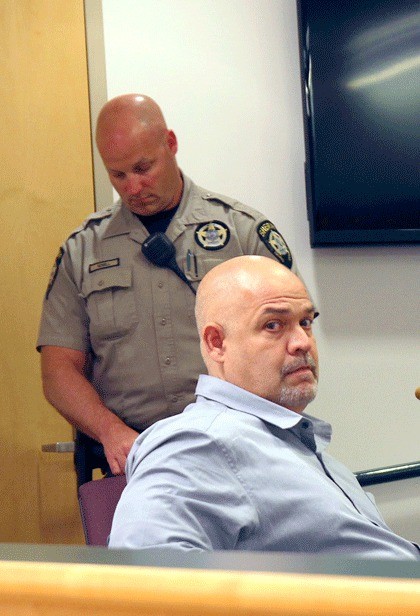A jury in Island County Superior Court will decide whether a sexually violent predator should be allowed to live on North Whidbey or be returned to the state’s special treatment center.
In 2000, Curtis Brogi was the first person in Island County to be civilly committed under the state’s Sexually Violent Predator Act. He has been living at the Special Commitment Center on McNeil Island ever since.
Brogi committed “numerous acts of sadistic sexual violence against young girls and women” during the 1980s and 1990s, mostly on Whidbey Island, according to the Attorney General’s Office brief on the case.
Brogi is asking to be released to a “less-restrictive alternative.” He proposes living in a home near Naval Air Station Whidbey Island with supervision and intensive sex-offender and substance abuse treatment.
The trial to determine Brogi’s future began this week and is expected to last two weeks. The state Attorney General’s Office opposes Brogi’s plan for a less-restrictive alternative.
During opening arguments Thursday, attorneys on both sides emphasized that another jury already found Brogi is a “sexually violent predator” and Brogi isn’t challenging that. Under state law, a sexually violent predator is defined as someone who was convicted of a sexually violent crime and has a mental abnormality or personality disorder making it more likely than not that he will commit another sexually violent crime.
The question the jury must answer now, the attorneys explained, is whether the less-restrictive alternative is in Brogi’s best interest and whether the plan adequately protects the community.
Brogi’s attorney, Lin-Marie Nacht, admitted to the jury during opening statements that her client had serious drug-and-alcohol problems as a younger man and committed “really awful crimes.”
“He was involved in a brutal, alcohol-soaked, misogynistic lifestyle,” she said.
Brogi, she told the jury, was resistant to treatment and supervision after he was first committed, but his life changed after he became involved with Native American religion at the Special Commitment Center. His mother was a Native American, Nacht explained.
The Native American program isn’t necessarily sex offender treatment, Nacht said, but “whole body treatment.” She said it emphasizes responsibility.
Brogi also started participating in sex offender treatment at the center, which Nacht described as limited and “one-size-fits-all.” She said the treatment consists of group sessions and that it can be hard for some men to disclose “private” details to the men they live with.
“There are too many guys with too few counselors who switch out on too regular a basis,” she said.
Under the plan for the less-restrictive alternative, Brogi would get much more treatment. He would meet with his treatment provider for individual sessions twice a week and a group session once a week; Nacht said the experienced treatment provider has agreed to incorporate elements of Native American beliefs into the sessions. Brogi would also receive group and individual chemical dependency treatment each week.
Brogi proposes to live in a house, located near the base on Degraff Road, that his parents own. He would be living there by himself, but his parents agreed to look in on him every day.
In addition, Brogi would be supervised by a community corrections officer from the state Department of Corrections. He would wear an ankle bracelet with real-time GPS tracking, Nacht said, and he would have to call the corrections officer before and after he went anywhere.
Brogi will take the stand and testify during the trial, Nacht said.
Josh Studor, the assistant attorney general, discussed an expert’s analysis and risk assessment of Brogi.
Brogi was diagnosed with a substance use disorder, an antisocial personality disorder and a sexual sadism disorder, which Studor said is a dangerous combination.
While Brogi has made progress in treatment, he still needs to work on things like hostility toward women and resistance to supervision, Studor said.
“He has not done enough treatment to be released,” the attorney said. “He is not ready yet.”
Studor questioned the practicality of the less-restrictive alternative plan. Brogi’s treatment providers would be in the Tacoma area. Brogi would get transportation to treatment at least three times a week. That’s 123 miles one way, or about three hours, and would cost $780 each day, Studor said.
The community corrections officer is in Seattle, which will make it hard to supervise Brogi on a regular basis, Studor said.
Studor also described for the jury some of the crimes Brogi committed against women.
Brogi, with a roommate, raped a 15-year-old girl multiple times in their apartment; Brogi tricked a 17-year-old girl into his van, where he threatened her and forced anal and oral sex on her; he raped his fiancee; he tricked a woman at a campground to go down a logging road, where he threatened her with a gun, forced her to take off her clothes, took photos, raped her and hit her hard enough to perforate her ear drum.
In 1996, Brogi lured a woman to his parents’ home under the pretext that he had a job for her. He pointed a gun at her, made her undress, tied her to his bed and fondled her. Brogi passed out and the victim was able to escape. Brogi was convicted of assault in the second degree with sexual motivation and was sentenced to prison.
After serving his prison sentence, Brogi was civilly committed.
Documents filed by the state indicate that Brogi denies raping anyone.
“The state does not anticipate Mr. Brogi will take responsibility for the crimes I have laid out,” Studor said.



